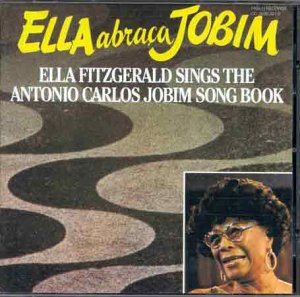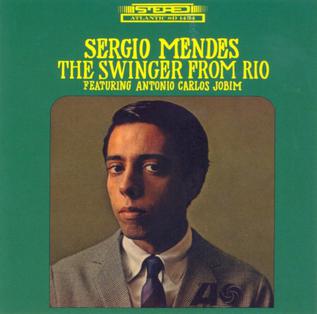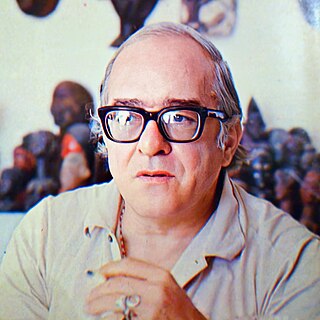
Antônio Carlos Brasileiro de Almeida Jobim, also known as Tom Jobim, was a Brazilian composer, pianist, guitarist, songwriter, arranger, and singer. Considered one of the great exponents of Brazilian music, Jobim internationalized bossa nova and, with the help of important American artists, merged it with jazz in the 1960s to create a new sound, with popular success. As a result, he is sometimes known as the "father of bossa nova".

Jazz Samba is a bossa nova album by Stan Getz and Charlie Byrd released by Verve Records in 1962. Jazz Samba signaled the beginning of the bossa nova craze in America. Stan Getz was the featured soloist and the tracks were arranged by Charlie Byrd, who had first heard bossa nova during a tour of Brazil in 1961.
Dom Um Romão was a Brazilian jazz drummer and percussionist. Noted for his expressive stylings with the fusion band Weather Report, Romão also recorded with varied notable artists such as Cannonball Adderley, Paul Simon, Antonio Carlos Jobim, Jorge Ben, Sergio Mendes and Brasil '66, and Tony Bennett. He was the percussionist Tom Jobim brought to the studio for the album Jobim recorded with Frank Sinatra in 1967 for Reprise Records, Francis Albert Sinatra & Antônio Carlos Jobim.

Francis Albert Sinatra & Antônio Carlos Jobim is a 1967 album by Frank Sinatra and Antônio Carlos Jobim. The tracks were arranged and conducted by Claus Ogerman, accompanied by a studio orchestra. Along with Jobim's original compositions, the album features three standards from the Great American Songbook, arranged in the bossa nova style.

Ella Abraça Jobim or Ella Fitzgerald Sings the Antonio Carlos Jobim Songbook is a 1981 studio album by Ella Fitzgerald, devoted to the songs of Antônio Carlos Jobim.

The Composer of Desafinado, Plays is the first album by Antônio Carlos Jobim. Released in 1963, the album features a dozen instrumentals arranged by Claus Ogerman, whose work would mark the beginning of a lifelong musical relationship with Jobim. Of these twelve songs, nearly all of them are jazz standards. The opening track "The Girl from Ipanema" is believed to be the second most recorded song in history behind The Beatles' "Yesterday," and a recording of the song by Astrud Gilberto and Stan Getz became a worldwide hit in 1964.

The Wonderful World of Antônio Carlos Jobim is the second studio album by Antônio Carlos Jobim with arrangements by Nelson Riddle. It was released in 1965 and was number 57 on the US Albums 1965 year-end chart.
Love, Strings and Jobim is a 1966 album by various Brazilian artists who play new Brazilian songs by various composers. Because Antônio Carlos Jobim is pictured on the cover and mentioned in the title, he has been and continues to be credited to be the performing artist on the album. Jobim does not appear on the album except as a composer. The original Brazilian title of this album is "Tom Jobim Apresenta" and it appeared on the Elenco label.

Wave is the fifth studio album by Brazilian jazz musician Antônio Carlos Jobim, released in 1967 on A&M Records. Recorded in the US with mostly American musicians, it peaked at number 114 on the Billboard 200 chart, as well as number 5 on the Jazz Albums chart.

The Sinatra–Jobim Sessions is a 1979 double LP compilation album of Frank Sinatra's work with Antônio Carlos Jobim. The album was published only in Brazil by producer Roberto Quartin, and had never been re-released on vinyl or CD until 2010 when it was re-mastered and released under The Frank Sinatra Collection and became available worldwide.
"Meditation" is a bossa nova and jazz standard song composed by Antônio Carlos Jobim and Newton Mendonça. The English version has lyrics by Norman Gimbel. In Finland, the song was recorded in 1963 by Olavi Virta with lyrics by Sauki under the title "Hymy, flower and love". Erkki Liikanen recorded the song in 1967 with lyrics by Aarno Raninen under the title "Taas on hiljaisuus".
"Wave" is a bossa nova and jazz standard song written by Antônio Carlos Jobim. Recorded as an instrumental on his 1967 album of the same name, its English lyrics were written by Jobim himself later that year.
"Dindi" is a song composed by Antônio Carlos Jobim, with lyrics by Aloysio de Oliveira. It is a world-famous bossa nova and jazz standard song. Jobim wrote this piece especially for the Brazilian singer Sylvia Telles. "Dindi" is a reference to a farm named "Dirindi", in Brazil, a place that Jobim and his friend/collaborator Vinicius de Moraes used to visit. In December 1966, just a short while after Telles had recorded this piece with the guitarist Rosinha de Valença, she was killed in a road accident in Rio de Janeiro.
"Someone to Light Up My Life" is a song composed by Antônio Carlos Jobim, with lyrics by Vinicius de Moraes. It was written for the play Orfeu da Conceição (1956). English lyrics were added by Gene Lees.

The Swinger from Rio is a 1966 album by Sérgio Mendes. Recorded over three days in December 1964 for the Atlantic label, it features guest artists Phil Woods, Art Farmer, and Hubert Laws, plus Antônio Carlos Jobim on rhythm guitar. It has also been released under the title Bossa Nova York.

Jazz Samba Encore! is a bossa nova album by Stan Getz and Luiz Bonfá, released on the Verve label. It is bossa nova in a slower groove. It contains a mix of Jobim standards as well as originals from Bonfá. Performers also include Antonio Carlos Jobim and vocalist Maria Toledo, Bonfá's wife. The painting on the cover is a piece by the influential New York based abstract expressionist Olga Albizu from Puerto Rico.

Sinatra/Jobim: The Complete Reprise Recordings is a 2010 compilation album by Frank Sinatra, consisting of 20 tracks he recorded with the Brazilian musician Antônio Carlos Jobim.

Orfeu da Conceição is a stage play with music in three acts by Vinicius de Moraes and music by Antônio Carlos Jobim. It premiered in 1956 in Rio de Janeiro. The play became the basis for the films Orfeu Negro and Orfeu (1999), and for the musicals Orfeu and Black Orpheus.
"Sabiá" is a Brazilian song composed in 1968 by Antônio Carlos Jobim, with lyrics by Chico Buarque. English-language lyrics were written later by Norman Gimbel.
"O Morro Não Tem Vez", also known as "Favela", "O Morro", and "Somewhere in the Hills", is a bossa nova jazz standard composed by Antônio Carlos Jobim with lyrics written by Vinicius de Moraes. The English lyrics were written by Ray Gilbert.











